|
|
| |
|
| |

Pioneers in
Arts, Humanities, Science, Engineering, Practice (PAHSEP)
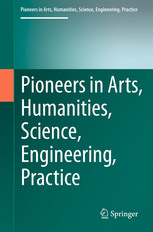
Edited by
Hans Günter Brauch,
AFES-PRESS, chairman
Free University of Berlin (Ret.)
Important Links on Louis Kriesberg
On the Author’s Videos and Podcasts
On Louis Kriesberg Books
On the Author’s Academic Institutions
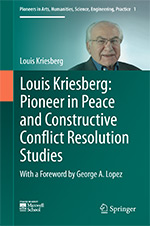
|
Louis Kriesberg: Louis Kriesberg: Pioneer in Peace and Constructive Conflict Resolution Studies (Cham – Heidelberg – New York – Dordrecht – London: Springer International Publishing, 2016).
ISBN: 978-3-319-40750-0 (Hardcover)
ISBN: 978-3-319-40751-7 (EBook)
Doi: 10.1007/ 978-3-319-40751-7 (add chapter no.)
Order this book on Springer Website |
On this Book |
On the occasion of his 90th birthday Louis Kriesberg provides an informative account of his career, tracing the trajectory of his discoveries, contributions, and fumbles as he sought to help the advance toward a more sustainable and just peace in the world. His work contributes to ideas and practices in several areas of conflict studies, notably intractable conflicts and their transformation, reconciliation, conflict analysis, and waging conflicts constructively. Although neither an autobiography nor a memoir, he embeds the course of his work in the context of historical events and in the evolving fields of peace studies and conflict resolution. In addition, he discusses the interaction of those fields with major conflicts. The book includes seven previously-published exemplary pieces on these and other topics, a comprehensive list of his publications, and several photos. A discussion of Kriesberg’s work and its significance is provided by George A. Lopez, Professor of Peace Studies, University of Notre Dame.
Contents
Foreword by George Lopez
Part I: On Louis Kriesberg: 1 Kriesberg Reflections: Discovering Constructive Ways of Peacemaking—2 Louis Kriesberg’s Comprehensive Bibliography
Part II: Seven Key Texts by Louis Kriesberg 3 Reflections on My Roles, Identities, and Activities Relating to Conflict Resolution (1999)—4 Nature, Dynamics, and Phases of Intractability (2005)—5 Reconciliation: Aspects, Growth, and Sequences (2007)—6 The Evolution of Conflict Resolution (2009)—7 Waging Conflicts Constructively (2009)—8 The Changing State-of-the-Art of the Conflict Transformation Field (2011)—9 Moral Judgments, Human Needs and Conflict Resolution: Alternative Approaches to Ethical Standards (2012) |
| |
On the Author |
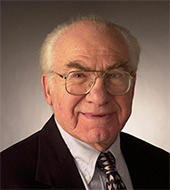 |
Louis Kriesberg (Ph.D. 1953, University of Chicago) is Professor Emeritus of Sociology, Maxwell Professor Emeritus of Social Conflict Studies, and founding director of the Program on the Analysis and Resolution of Conflicts (1986–1994), all at Syracuse University. In addition to over 160 book chapters and articles, his published books include: Realizing Peace: A Constructive Conflict Approach (2015), Constructive Conflicts, 4th ed., (2012) co-authored with Bruce W. Dayton, (earlier editions 1998, 2003, 2007), Conflict Transformation and Peacebuilding (co-ed, 2009), International Conflict Resolution (1992), Timing the De-Escalation of International Conflicts (co-ed., 1991), Intractable Conflicts and Their Transformation (co-ed., 1989), Social Conflicts .(1973, 1982), Social Inequality (1979), Mothers in Poverty (1970), Social Processes in International Relations (ed., 1968), and Research in Social Movements, Conflicts and Change (ed., Vols. 1-14, 1978-1992). He was President of the Society for the Study of Social Problems (1983–1984), and he lectures, consults, and provides training regarding conflict resolution, security issues, and peace studies.
Address: Prof. Louis Kriesberg, PARCC, Eggers 400, Syracuse University, Syracuse, NY 13244, USA.
Email: <LKriesbe@maxwell.syr.edu> |
| |
|
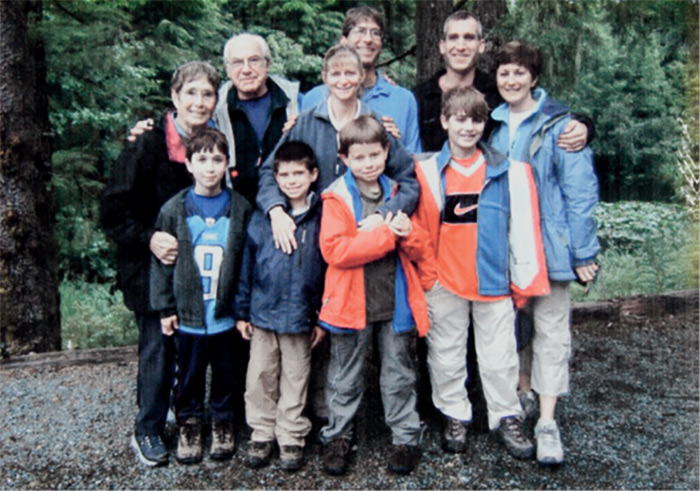
Kriesbergs: Lois, Michael, Louis, Scott, Karen and Dan, Zachary, Joshua, Joe and Dina,
in Alaska in 2005. Source: The author’s personal photo collection |
| |
Important Links on Louis Kriesberg
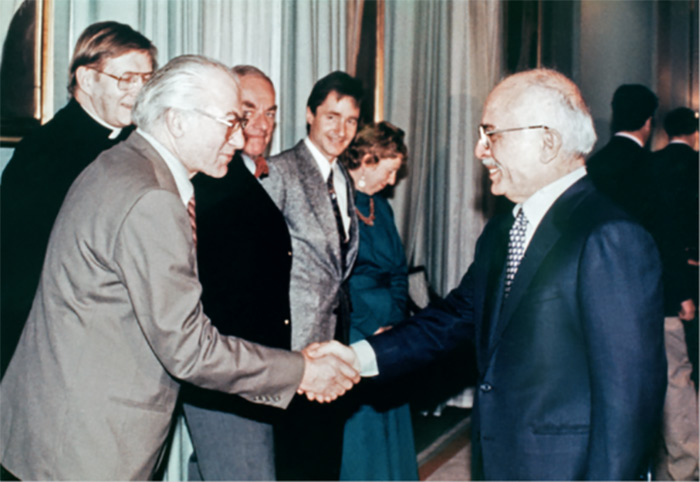
Louis Kriesberg and King Hussein of Jordan in 1993. Source: The author’s personal photo collection
On the Author’s Videos and Podcasts
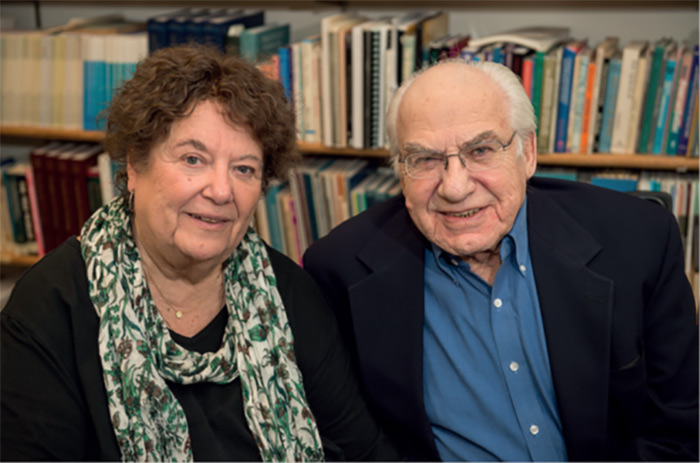
Louis Kriesberg and Paula Freedman, in Syracuse University office in 2016.
Source: The author’s personal photo collection
|
| |
|
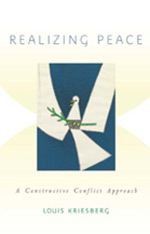 |
Realizing Peace: A Constructive Conflict Approach,
NY: Oxford University Press, 2015.. |
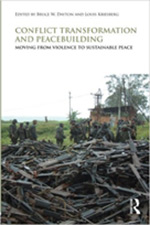 |
Conflict Transformation and Peacebuilding:
Moving from Violence to Sustainable Peace,
co-edited with Bruce W. Dayton,
Oxford, UK: Routledge, 2009.. |
| |
|
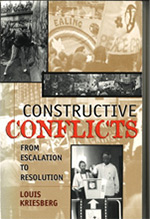 |
Constructive Conflicts:
From Escalation to Resolution,
Lanham/Boulder/New York/ Oxford: Rowman & Littlefield, 1998,
rev. 2nd ed., 2003,
rev. 3rd ed., 2007,
rev 4th ed., co-authored with Bruce W. Dayton, 2012. |
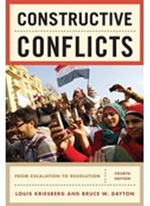 |
|
| |
|
|
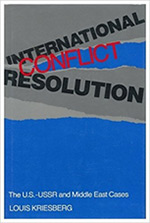 |
International Conflict Resolution:
The U.S.-U.S.S.R. and Arab-Israeli Cases,
New Haven: Yale University Press, 1992.
Epilogue adapted and reprinted as "Alternative Explanations of the Gulf War,"
in Lessons from the Gulf War: Social Science Findings,
Herbert Blumberg and Christopher French (Eds.)
Lanham, MD: University Press of America. |
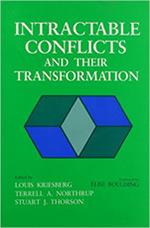 |
Intractable Conflicts and Their: Trans-formation
by Louis Kriesberg, Terrell A. Northrup, Stuart J. Thorso
(Syracuse: Syracuse University Press. 2005). |
| |
|
 |
Timing the De-Escalation of International Conflicts,
Co-Ed. with Stuart Thorson,
Syracuse: Syracuse University Press, 1991. |
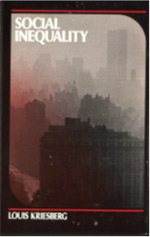 |
Kriesberg, Misztal and Mucha 1988,
Kriesberg 1992:
Social Inequality,
Englewood Cliffs, New Jersey: Prentice-Hall, 1979. |
| |
|
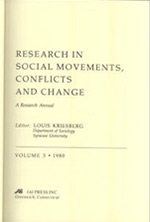 |
Research in Social Movements,
Conflicts and Change
Ed., Greenwich Connecticut: JAI Press, Vol. 1, 1978;
Vol. 2, 1979;
Vol. 3, 1980;
Vol. 4, 198 1;
Vol. 5, 1983;
Vol. 7, 1984;
Vol. 8, 1985. . |
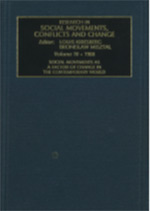 |
| . |
| |
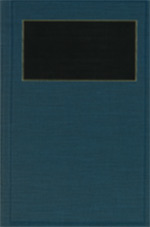 |
Research in Social Movements,
Conflicts and Change,
Ed., Greenwich Connecticut: JAI Press,
Vol. 14, 1992. |
|
| |
| |
|
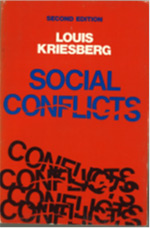 |
The Sociology of Social Conflicts,
Englewood Cliffs, New Jersey: Prentice-Hall, 1973;
rev. 2nd ed., Social Conflicts, 1982.
Translated into Spanish as
Sociologia de los Conflictos Sociales
by Contin, Editorial Trillas, Mexico, 1975 |
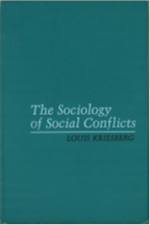 |
| |
| |
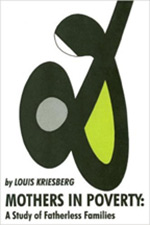 |
Mothers in Poverty:
A Study of Fatherless Families,
Chicago: Aldine, 1970.
Reprinted by Greenwood Press, 1979.
Paperback edition, Transaction Books, 2006. |
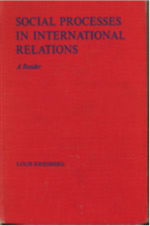 |
Social Processes in International Relations:
A Reader,
Ed., New York: John Wiley & Sons, 1968.. |
| |
|
| |
"Fatherless Families and Housing:
A Study of Dependency,"
(with Seymour S. Bellin)
Syracuse University Youth Development Center (offset), 1965. |
|
“Mental Health and Public Health Personnel and Programs:
Their Relations in the Fifty States,"
National Opinion Research Center: Report No. 83, 1962. |
| |
|
|
| |
"Public Attitudes Toward Prepaid Dental Care Plans,"
(Kriesberg and Trieman)
National Opinion Research Center: Report No. 76, 1960. |
|
| |
|
On the Author’s Academic Institutions

Chartered in 1870, Syracuse University is a private, coeducational, urban institution located in the heart of Central New York.
Total University enrollment for fall 2015 is 21,789. Full-time undergraduate, 14,566; part-time undergraduate, 630; full-time graduate and law school, 4,765; part-time graduate and law school, 1,828. Tenured and tenure-track faculty, 910; full-time non- tenure-track faculty, 240; part-time non-tenure-track faculty, 551.
Syracuse University conferred these academic degrees: Bachelor’s, 3,451; master’s, 1,919; doctoral degrees— professional, 198; doctoral degrees-—research, 155.
Since its founding in 1870, Syracuse University has had an illustrious history of educational excellence. Among SU's milestones are:
-
1870 Promotes equal education for men and women.
-
1874 Offers the nation's first bachelor of fine arts (B.F.A.) degree.
-
1924 Creates the Maxwell School of Citizenship and Public Affairs, one of the few schools in the nation to combine the social sciences and public administration education.
-
1934 Pioneers one of the nation's first schools of journalism, now the S.I. Newhouse School of Public Communications.
-
1946 Welcomes returning World War II veterans under the G.I. Bill of Rights and enrollment quickly triples.
-
1961 Celebrates the selection of Ernie Davis '62 as the first SU football player and first African American to win the Heisman Trophy.
-
1971 Establishes an intercollegiate athletics program for women.
-
1980 Builds the Carrier Dome, the only domed stadium in the Northeast and the largest structure of its kind on a college campus in the country.
-
1996 Receives the Theodore M. Hesburgh Award for best demonstrating successful innovative faculty development programs to enhance undergraduate education.
-
2002 Becomes the site of the New York State Center of Excellence in Environmental and Energy Systems.
-
2003 Wins the NCAA Division 1 Men's Basketball Championship.
-
2004 Inaugurates Nancy Cantor as the University's 11th Chancellor and President.
-
2005 Earns recognition as one of the nation's "Colleges with a Conscience."
-
2007 Launches The Campaign for Syracuse University, the most ambitious fund-raising effort in the University's history.
-
2008 Presents a major exhibition of original drawings and writings by Renaissance master Michelangelo Buonarroti at the SUArt Galleries on campus and the Joseph I. Lubin House in New York City.
-
2008 Hosts the Syracuse premiere of Universal Picture's The Express—a feature film about the life and times of football legend Ernie Davis '62.
Syracuse University, 900 South Crouse Ave, Syracuse, NY 13244
http://www.syr.edu/index.html .
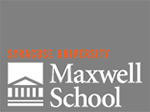
The Maxwell School of Citizenship and Public Affairs is Syracuse University’s home for innovative, interdisciplinary teaching and research in the social sciences, public policy, public administration, and international relations. It includes America’s leading graduate school of public affairs, offering highly regarded professional degrees alongside advanced scholarly degrees in the social sciences; and it is home to undergraduate programs across the full spectrum of the social sciences.
Maxwell’s strength derives in large part from its diversity — the unmatched variety of educational missions that co-exist and sometimes mix under its roof. On the graduate side, for example, Maxwell is home to strong master's degree programs in public administration and international relations, in conventional and midcareer formats. And, under the same roof, Maxwell offers MA and PhD programs in the social sciences, plus an innovative Social Science PhD program for students with unique, cross-disciplinary interests. No major graduate school of public affairs mixes these diverse elements the way Maxwell does. (The MPA program, incidentally, is consistently ranked number one in America by U.S.News & World Report).
Undergraduates who major or minor in the social sciences benefit from the same faculty who earn Maxwell its high rankings in research and graduate education. They teach undergraduate programs in anthropology, economics, geography, history, international relations, political science, and sociology, and in the policy- and skills-oriented public affairs program. Maxwell's rich, defining interest in the nature and mechanics of democratic citizenship is served by the team-taught MAX Courses and by the School’s new signature major in citizenship and civic education. Together, they advance a legacy of interdisciplinary citizenship education at the Maxwell School that is now 90 years old.
Maxwell scholars and students conduct wide-ranging research through nine interdisciplinary centers, each focused on a topical area within public affairs, such as social and economic policy, conflict and collaboration, public wellness, aging, energy and environment, national security, and regional studies, among others.
Most programs are housed in a pair of connected structures that include Melvin A. Eggers Hall, opened in 1993, and Maxwell Hall, opened in 1937 and substantially renovated in 1994. The complex includes a café, a suite of conference and working spaces for professional degree students, and carrel-style "grad bays" for all doctoral and many master's students.
Maxwell is one of the 12 schools and colleges of Syracuse University, a large, comprehensive, and distinguished private university located in upstate New York. Syracuse, New York, is a comfortable mid-sized city with the amenities of a metropolitan center, and only minutes from a great variety of rural and natural attractions.
http://www.maxwell.syr.edu/
|
|
|
|